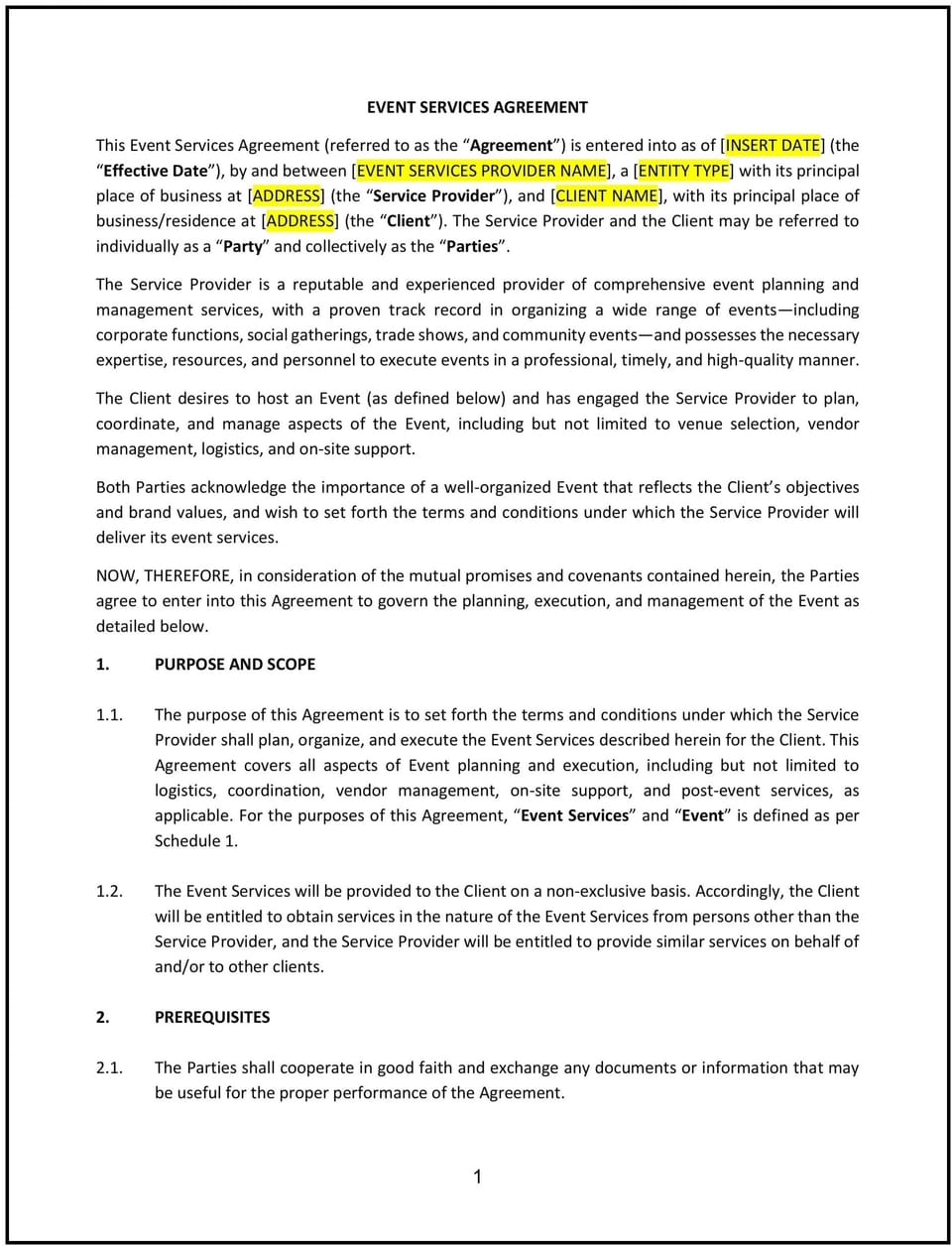Event Services Agreement (Kentucky): Free template

Event Services Agreement (Kentucky)
An Event Services Agreement is a legal contract between an event service provider (the "Service Provider") and a client or organization (the "Client"), where the Service Provider agrees to provide specific services for an event. In Kentucky, this agreement must comply with state laws regarding contracts, business transactions, intellectual property, and consumer protection. A well-drafted agreement ensures clarity, minimizes disputes, and protects both parties' interests.
For example, a wedding planner in Louisville might enter into an Event Services Agreement with a couple planning their ceremony in Lexington. The agreement specifies the scope of services, payment terms, timelines, and other critical details.
Tips for drafting and maintaining an Event Services Agreement in Kentucky
- Identify the parties: Clearly specify the names, contact information, and roles of both the Service Provider and the Client.
- Example: “This Event Services Agreement is entered into by [Service Provider Name], located at [Address], and [Client Name], located at [Address].”
- Define the scope of services: Outline the specific services the Service Provider will deliver, including setup, coordination, equipment rental, staffing, or other event-related tasks.
- Example: “The Service Provider agrees to provide the following services: [List of Services, e.g., venue setup, catering coordination, audiovisual support].”
- Specify pricing and payment terms: Detail how the Client will compensate the Service Provider, including deposits, installment payments, and final balances.
- Example: “The Client shall pay a deposit of [Amount]uponsigningthisagreementandtheremainingbalanceof[Amount] no later than [Date/Upon Completion of Services].”
- Address timelines and milestones: Provide a detailed schedule for service delivery, including deadlines for preparation, setup, execution, and teardown.
- Example: “The Service Provider shall complete all setup by [Setup Date and Time] and begin teardown no earlier than [Teardown Start Time].”
- Include quality standards: Set expectations for the quality of services, adherence to agreed-upon specifications, and any industry standards.
- Example: “The Service Provider shall adhere to industry standards and ensure all services meet the specifications outlined in Exhibit A.”
- Add intellectual property provisions: Clarify ownership of intellectual property, such as designs, branding, or content created during the event.
- Example: “All intellectual property rights related to materials created by the Service Provider for the event shall remain the exclusive property of the Client unless otherwise agreed.”
- Include liability and indemnification: Clarify each party’s liability in case of errors, damages, or breaches of the agreement.
- Example: “The Service Provider shall not be liable for any delays or issues caused by factors outside their control, such as weather conditions or third-party vendors.”
- Include a termination clause: Specify conditions under which the agreement can be terminated by either party and outline refund policies.
- Example: “This agreement may be terminated by either party with [Number] days’ written notice if the other party fails to fulfill its obligations.”
- Outline governing law and jurisdiction: Ensure the agreement specifies that it is governed by Kentucky law and identifies the appropriate courts for dispute resolution.
- Example: “This agreement is governed by the laws of the Commonwealth of Kentucky. Any disputes arising under this agreement shall be resolved in the courts of [County], Kentucky.”
- Include signatures: Both parties must sign and date the agreement to make it legally binding.
- Example: “IN WITNESS WHEREOF, the parties have executed this Event Services Agreement as of the date first written above.”
Frequently asked questions (FAQs)
Q: What happens if the Service Provider fails to deliver services on time in Kentucky?
A: The agreement should include penalties or remedies for late delivery, such as partial refunds, discounts, or contract termination, depending on the severity of the delay.
Q: Can the Client request changes to the services after signing the agreement in Kentucky?
A: Yes, but any changes should be documented in writing and signed by both parties to avoid misunderstandings. The agreement should include a clause addressing change requests.
Q: How are disputes resolved under Kentucky law?
A: Disputes are typically resolved through negotiation, mediation, or litigation, depending on the terms of the agreement. Including a dispute resolution clause can streamline this process.
Q: What happens if the Client cancels the event in Kentucky?
A: The agreement should outline refund policies or alternative arrangements, such as transferring services to a future event or project.
Q: Are exclusivity clauses enforceable in Kentucky?
A: Yes, exclusivity clauses are enforceable in Kentucky, provided they are reasonable in scope and duration. They protect the Service Provider’s investment and ensure competitive advantages.
Q: Can the Service Provider subcontract work without consent in Kentucky?
A: Subcontracting requires explicit permission in the agreement or written consent from the Client. Unauthorized subcontracting may constitute a breach of contract.
This article contains general legal information and does not contain legal advice. Cobrief is not a law firm or a substitute for an attorney or law firm. The law is complex and changes often. For legal advice, please ask a lawyer.


